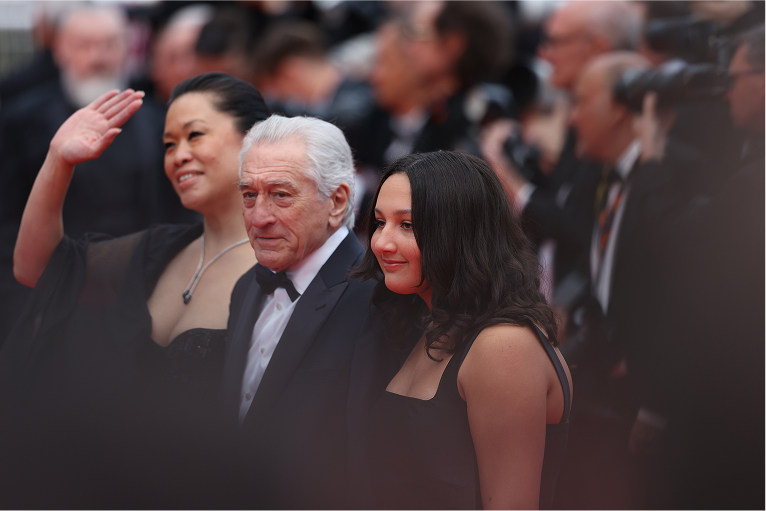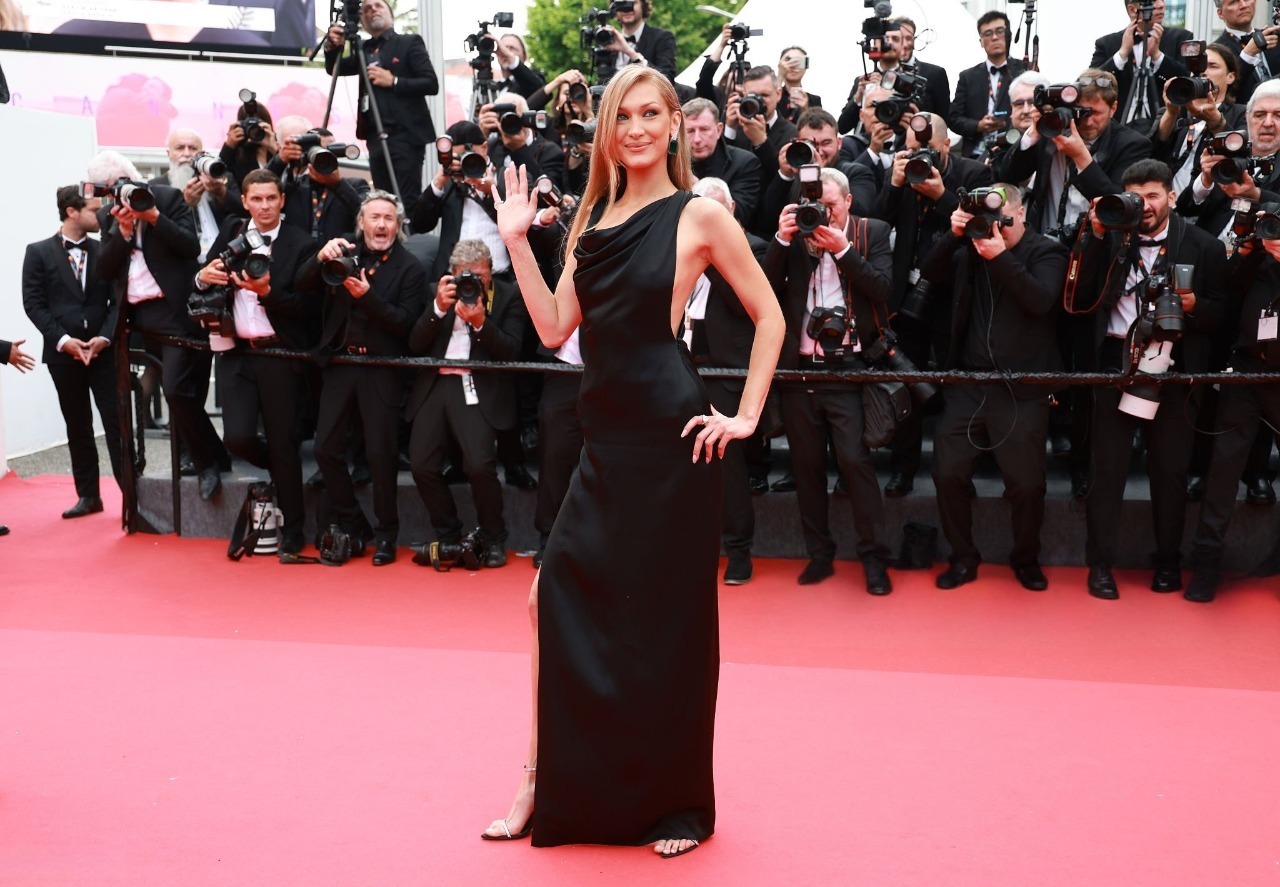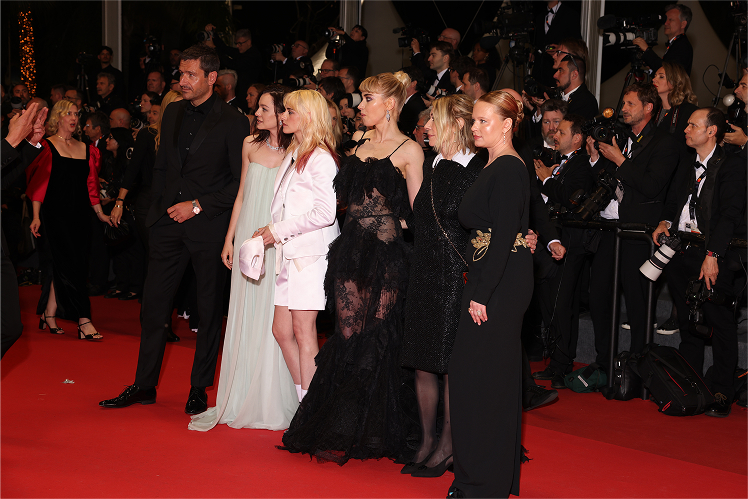As Kristen Stewart adjusted her vintage Cartier cuff beneath the Carlton's awning, watching Robert De Niro emerge from his black Mercedes, the Mediterranean chose its moment with characteristic drama - exhaling at the precise moment the premiere loomed, sending Valentino trains and Brioni lapels into elegant disarray. De Niro, seventy-nine and still radiating that particular brand of New York defiance, paused to absorb the weight of what lay ahead. Behind him, his security detail exchanged glances - they'd been briefed about potential political protests, but De Niro had insisted on walking the full carpet regardless.

In the cathedral hush before the Grand Théâtre Lumière surrendered to darkness, Chanel No. 5 performed its eternal dance with salt air and pure ambition. Outside, the Croisette gleamed under that particular Riviera moonlight that has been seducing mortals and movie stars for three-quarters of a century - palm fronds conducting whispered conspiracies whilst camera shutters clicked their relentless paparazzi symphony. Stewart shifted her weight, barefoot now, her toes touching the cool Carlton marble, watching the circus unfold with the detached fascination of someone who'd crossed from actor to auteur in a single festival cycle.
Once again, Cannes returned with its signature cocktail of reverence and rebellion, transforming a Mediterranean resort town into cinema's unofficial world capital. Not merely a film festival but a cultural battlefield where art collides with algorithm, where legends are crowned and occasionally dethroned, where the eternal question "What is cinema?" gets debated in seventeen languages over Dom Pérignon '96 and answered by none.
The 78th edition arrived with characteristic pomp. But beneath those ritualistic twelve-minute ovations Cannes wears like a badge and the nine-figure streaming deals, its true heartbeat pulsed elsewhere - in rooftop negotiations where first-time directors pitched their souls to Netflix executives, in whispered jury room tensions where Binoche's humanitarian agenda clashed with commercial pressures, in the way Cannes continues holding up its unforgiving mirror to our collective cinematic conscience.
The Carlton Diplomatic Zone
May in Cannes exists in its own temporal dimension - a sun-drunk contradiction where ancient glamour meets contemporary urgency. The Carlton and Hôtel Martinez served as neutral territories for modern cinema's identity crisis, their terraces transformed into diplomatic zones where rosé functions as lingua franca and influence gets measured in Instagram metrics.
Even this year's controversial red carpet restrictions - those whispered prohibitions against strategic nudity and scene-stealing trains - failed to diminish the essential spectacle. If anything, they birthed a chic new vocabulary of restraint: Dakota Johnson's crystalline Gucci precision that cost more than most indie film budgets, Bella Hadid's sculptural Saint Laurent that spoke in architectural whispers rather than fashion shouts. No train swept the stairs this year, but egos still flowed unhemmed.

Getty Images
Yet whilst the world fixated on the Croisette's sartorial theatre, the festival's most profound magic unfolded in quieter sanctuaries. On the sun-dappled terrace of the Carlton, where a magnum of Krug Clos d'Ambonnay '98 commanded €3,000 and somehow felt appropriate, an Iranian director spoke in measured tones, his quiet defiance still palpable. Nearby, Marvel executives whispered urgently into phones about release dates, while A24’s team circled like elegant sharks around a promising Romanian debut.
"Cannes is not just a festival," he said, watching superyachts drift across the bay like white prayers - each one worth more than his country's annual film budget. "It's a mirror. It reflects who we are - and sometimes, who we're afraid to become."
Opening Acts and Power Plays
The Opening Ceremony on 13 May established the festival's defiant tenor with surgical precision. Robert De Niro, accepting his lifetime achievement award, transformed his golden moment into political manifesto, his words cutting through diplomatic niceties whilst the industry collectively held its breath. You could feel the discomfort ripple through the Palais - agents checking their phones, publicists calculating damage control. Jury president Juliette Binoche followed with her own passionate plea for humanity amid global chaos, her voice catching, barely audible as she spoke of "children" - a pause that held the room. This wasn't Cannes playing cultural diplomat - this was Cannes unfiltered, refusing its traditional role as entertainment industry sedative.

Later that evening, Tom Cruise held court at the Carlton bar with the precision of a Swiss timepiece - literally having descended from azure skies earlier for the out-of-competition première of Mission: Impossible – The Final Reckoning, now commanding attention beside a €40,000 bottle of Macallan 1946. His entourage of international co-stars formed a constellation around him, each calculating their proximity to pure magnetism. "The thing about practical effects," he confided to a German distributor over single malt, his eyes still carrying traces of adrenaline from the afternoon's helicopter stunt, "is they age better than digital promises." Though the film itself earned measured applause, Cruise's presence served as reminder of cinema's vanishing mythology: the authentic global movie star capable of commanding $20 million per picture whilst simultaneously stopping the Croisette in reverent silence.
The evening of 16 May pulsed with characteristic Cannes multiplicity: from Chopard's diamond-bright Trophée ceremony (where Caroline Scheufele unveiled a €2.1 million necklace that outshone most red carpet appearances) to the discreetly decadent Forbes Villa dinner. High above the coastline's glittering sprawl, filmmakers and financiers wove art and algorithm into the same conversation over truffle risotto and Château d'Yquem '01. Apple's film division representatives huddled with auteurs whose previous films had never seen theatrical release, whilst Amazon's acquisition team played chess with international sales agents over rights to films that existed only in treatment form.
This, too, defines Cannes - a place where hearts negotiate with hedge funds, where dreams require venture capital backing, where the gap between Palme d'Or and profit margin gets measured in streaming subscriber counts.
Competition Battleground
The 2025 selection proved rich with emotional archaeology and breathtaking audacity, though behind the scenes, streaming platforms fought territorial wars that would have impressed Machiavelli. Jafar Panahi's It Was Just an Accident claimed the Palme d'Or with quiet fury - an ex-prisoner's moral reckoning transformed into psychological thriller that left audiences breathless and Netflix executives frantically calculating global appeal. His return to Cannes after years of imprisonment in Iran felt simultaneously like triumph and reckoning, justice delayed but decidedly not denied.
Paul Mescal and Josh O'Connor delivered devastating intimacy in The History of Sound, their performances excavating tenderness from grief's harsh terrain whilst A24's team already whispered about awards campaigns and arthouse crossover potential. Mascha Schilinski's Sound of Falling offered hypnotic portraiture of womanhood across centuries, earning the Jury Prize through its meditation on time's cruel generosity - though industry insiders noted its three-hour runtime would challenge even the most committed distributors.
Sirat, captured on Super 16mm in Morocco's eternal deserts, felt like requiem for a world on the precipice, its pulse measured by techno beats and ancestral mourning. The film's minimal budget (€400,000) sparked passionate discussions about authentic cinema versus algorithmic content, whilst its director fielded offers from five different streaming platforms before the credits finished rolling.

Beyond established auteurs, fresh voices emerged with startling force. Kristen Stewart made her bold directorial debut with The Chronology of Water. That evening on the Carlton rooftop, Stewart stood barefoot at the edge, swirling a glass of Chablis as the weight of the week seemed to settle across her shoulders. Stewart described the act of directing as "drowning in the best possible way," her voice still hoarse from defending her film's experimental structure to potential distributors. Harris Dickinson's Urchin and Akinola Davies Jr.'s My Father's Shadow unveiled new cinematic talents destined for decades of critical adulation. The Directors' Fortnight and Critics' Week throbbed with these quieter, more urgent narratives - films that may never trouble multiplex spreadsheets but reshape the art form from within.
As the final credits rolled beneath a sky still scented with jasmine and ambition, Cannes 2025 had done what it always does best—mirror our cinematic dreams back to us, exaggerated, refracted, and unbearably real.
Photo by Yaro



